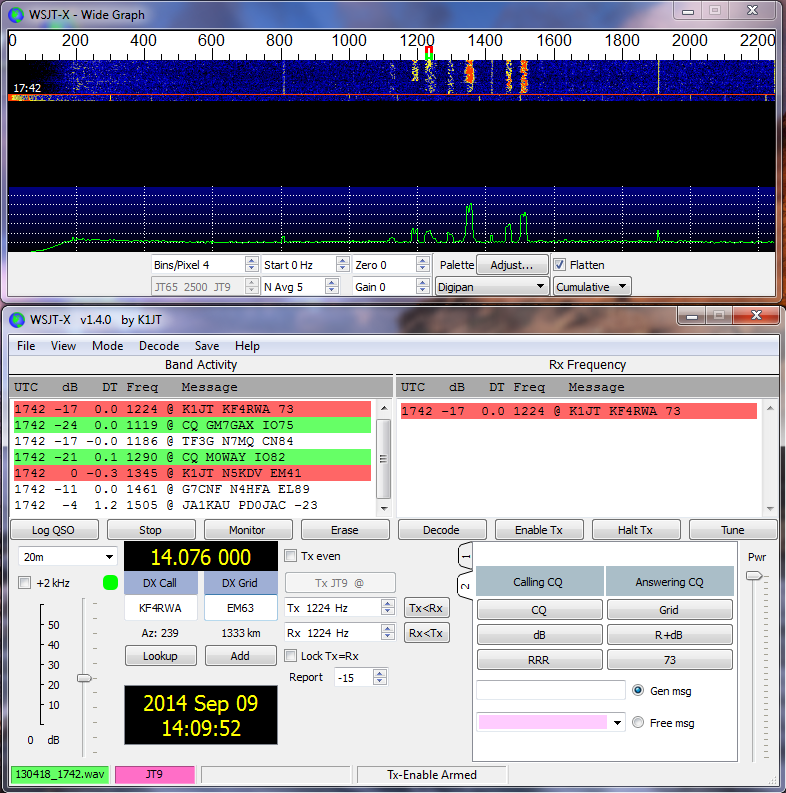WSJT-X version 2.5.3 released
The development team have announced the General Availability (GA) release of WSJT-X version 2.5.3.
Release: WSJT-X 2.5.3 Dec 7, 2021 ---------------------- This release has the following changes since release 2.5.2: - Add a note in memory of G4WJS to the About window - Add a simple $DXCALL macro capability for Tx messages, and update the User Guide accordingly - Ensure that MAIN VFO is used for receiving on rigs that require it - Repair a defect in reporting low-confidence decodes to PskReporter - Updated CTY.DAT database, tnx to Jim AD1C Release: WSJT-X 2.5.2 Nov 4, 2021 ---------------------- This is mostly a bug fix release. It has the following changes since release 2.5.1: - Repair a longstanding regression that caused signal reports from tail-ended Tx2 messages to be omitted from logged information - Parse "dx-call-1 RR73; dx-call-2 <de-call> +nn" messages (i3=0, n3=1 DXpedition mode) in regular 77-bit modes - Repair a regression associated with setting the main window width on program startup. - Repair a problem with Q65 decodes of type 'q3' for messages of the form "<Call_1> Call_2" - Execute code associated with Q65 decodes of type 'q5' only when the Max Drift control is set to 50. This fix prevents double-incrementing of the message averaging counter on the first decoding sequence. - Polarization offset 'Dpol' from the astronomical data window is now written to file azel.dat if environment variable WSJT_AZEL_EXTRA_LINES has been defined as 1 or greater. Dpol is especially useful for EME on the higher microwave bands. - The Auto Log QSO option in "Settings->Reporting" now behaves the same as the Prompt to log QSO option when not in a special operating context mode. - The Fast/Normal/Deep setting in Q65 mode is now a sticky setting and is no longer reset to Fast on program startup or when Settings has been opened. The user selection is used for automatic decodes, but Deep is used for any subsequent manual decode attempts. - New hamlib code to correct minor flaws in controlling several rigs. - Update the Chinese and Hong Kong translations of the user interface. - Note that since the WSJT-X v2.5.0 GA release we have not been providing pre-built 32-bit packages for Linux on Intel CPUs, this is due to the mainstream Linux Desktop distributions no longer providing updates for 32-bit only systems. 32-bit WSJT-X can still be built for Linux Intel and is supported at least until some prerequisite package is no longer available.
Links to the latest WSJT-X installation packages for Windows, Linux, and Macintosh are available here:
http://physics.princeton.edu/pulsar/k1jt/wsjtx.html
You can also download the packages from our SourceForge site:
https://sourceforge.net/projects/wsjt/files/
WSJT-X is licensed under the terms of Version 3 of the GNU General Public License (GPL). Development of this software is a cooperative project to which many amateur radio operators have contributed. If you use our code, please have the courtesy to let us know about it. If you find bugs or make improvements to the code, please report them to us in a timely fashion.
The authors and Copyright holders of WSJT-X request that derivative works should not publish programs based on features in WSJT-X before those features are made available in a General Availability (GA) release of WSJT-X. We will cease making public Release Candidate (RC) pre-releases for testing and user early access purposes if this request is ignored.
Bugs should be reported by following instructions found here in the User Guide:
https://www.physics.princeton.edu//pulsar/K1JT/wsjtx-doc/wsjtx-main-2.5.1.html#_bug_reports

